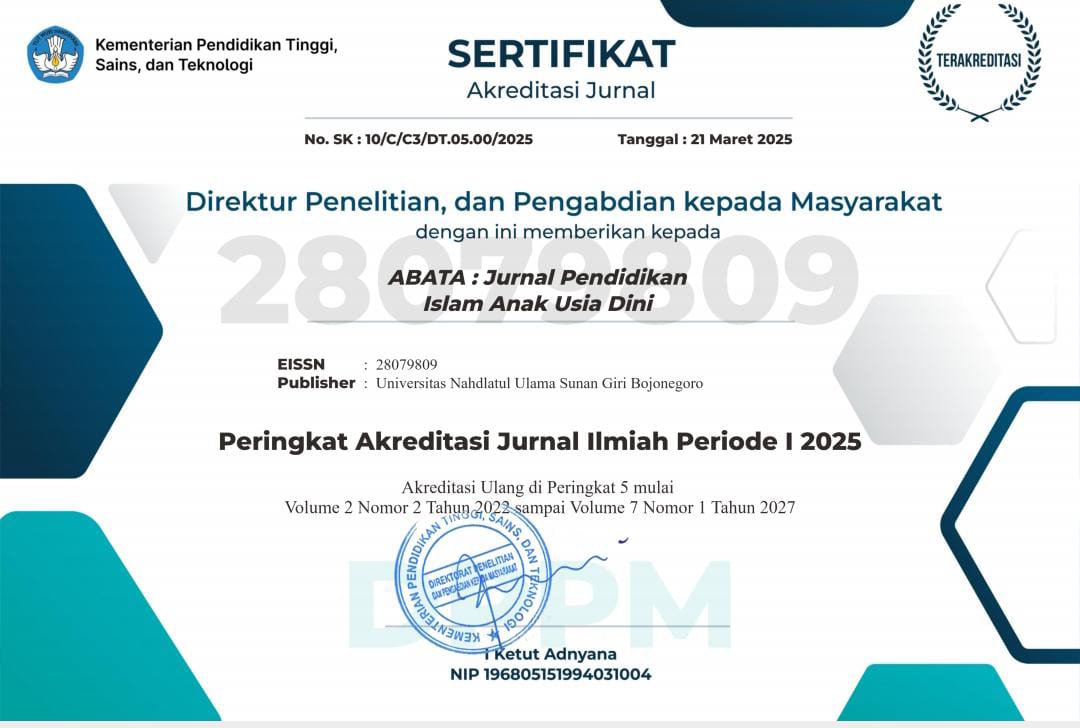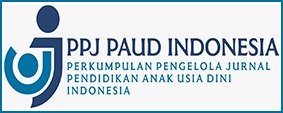DAMPAK CERAI-GUGAT TKI/TKW TULUNGAGUNG PADA KESEHATAN MENTAL ANAK USIA DINI

DOI:
https://doi.org/10.32665/abata.v2i1.349Keywords:
cerai gugat, TKI/TKW, kesehatan mental, anak usia diniAbstract
Mental health is an educated thought of the individual's family and environmental factors. Individual circumstances that can not be separated from various forms of mental turbulence. Individuals can be declared to have mental health if they can adjust and solve problems with good stress management. The biggest influence on mental health is the family factor. Because, in the family the individual feels safe and loved. However, there are differences in the families of Indonesian migrant workers. TKI/TKW families actually have various problems in carrying out family life. Poor communication increases stress, resulting in decreased mental health. Poor mental health triggers various conflicts and leads to separation (divorce). Tulungagung district in the province of East Java, is one of the districts with the highest number of migrant workers, which is more than 1000 workers abroad per year. However, Tulungagung district also has the highest divorce rate, which is 200-400 filings for divorce per month. This study was conducted to determine the main factors for the decline in the mental health of the families of Indonesian migrant workers, as well as the motives for divorce that have been carried out by the families of migrant workers and to determine the impact of divorce The research method used is descriptive qualitative. Collecting data using literature study and using Alfred Schutz's phenomenological theory approach containing cause and purpose motives. The decline in mental health for migrant workers' families is due to several factors, namely: 1) lifestyle changes, 2) a sense of loneliness from both parties, 3) lack of communication, 4) lack of sexual desire, 5) loss of responsibility.
References
Agung, Iskandar . 2012. Panduan Penelitian Tindakan Kelas bagi Guru. Jakarta: Bestari Buana Murni.
Baron, Roberta A. dan Donn Byrne. 2004. Perilaku Organisasi, Ratna Djuwita, Jakarta: Erlangga.
Gustiah, R. 2014. Hubungan Antara Intimacy Dengan Kepuasan Pernikahan Pada Silver Age.
Lestari, S. 2012. Psikologi keluarga: Penanaman Nilai dan Penanganan Konflik Dalam Keluarga. Jakarta: Kencana Prenada Media Group.
Muttaqin. 2019. Perceraian di Tulungagung Meningkat, Setahun Ada 2.611 Janda Baru. Available at: https://news.detik.com (Accessed: 2 Juni 2021).
Strong, Bryan & Christine DeVault. 1989. The Marriage and Family Experience 4thed. California : West Pub. Co.,
Subyantoro, Arief dan Suwarto, FX. 2007. Metode dan Teknik Penelitian Sosial. Yogyakarta: Andi.
Tribunnews.com, 2018. Viral di Facebook, Ternyata Pria Tulungagung yang Hancurkan Rumah Sendiri Simpan Kisah Sedih. Available at: https://today.line.me/id/v2/article/o8Oom5 (Accessed: 5 Juni 2021)
Undang-Undang nomor 18 Tahun 2014 pasal 1 tentang Kesehatan Jiwa
Undang-Undang Nomor 3 Tahun 1966 bab I pasal 1 tentang Kesehatan Jiwa
Undang-Undang Republik Indonesia Nomor 3 Tahun 1966 tentang Kesehatan Jiwa Bab I Pasal 1
Valentini, Veronica, Nisfiannoor, M. Jurnal Provitae Vo.2 No.1 Mei 2006. Identity Achievement Dengan Intimacy Pada Remaja SMA. Jakarta: Buku Obor Fakultas Psikologi Universitas Tarumanagara Jakarta Bekerjasama dengan Yayasan Obor Indonesia.
Wijaya, Yeni Duriana. 2019. Kesehatan Mental di Indonesia : Kini dan Nanti. Buletin Jagaddhita Vol. 1, No. 1, Februari 2019. Available at: https://jagaddhita.org/kesehatan-mental-di-indonesia-kini-dan-nanti/ (Accessed: 3 Juni 2021).
Downloads
Published
Issue
Section
License
Copyright (c) 2022 Abata : Jurnal Pendidikan Islam Anak Usia Dini

This work is licensed under a Creative Commons Attribution 4.0 International License.
 pdf Download: 1190
pdf Download: 1190















